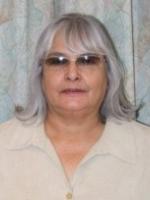The University of Lethbridge extends its sincere condolences to the family and friends of former employee Marie Smallface Marule, who passed away on Dec. 31, 2014 at the age of 70 years.
Marule came to the University of Lethbridge in February 1976, beginning work as an associated professional officer in the Native Students' Association. Later that year, she transitioned to the role of academic assistant and in 1983 assumed the title of assistant professor. She retired from the U of L in June 1989 and went on to become president of Red Crow College.
A memorial service for Marule occurred on Saturday, Jan. 10, 2015 at the Senator Gladstone Hall, Blood Reserve at 1 p.m.
The following tribute article on Marule appeared in the Jan. 8, 2015 Lethbridge Herald.
Smallface Marule leaves a legacy for Aboriginal rights
By Melissa Villeneuve
A prominent Blood Tribe woman who paved the way for improvements in Aboriginal education passed away on Dec. 31. Marie Smallface Marule, former president of Red Crow College, died at the age of 70 on New Year’s Eve, leaving a vivid legacy as an educator and advocate for Aboriginal rights around the world.
Marule took on the world at the young age of 18, becoming involved in Blood Reserve politics and a member of the Indian Association of Alberta. She was the first woman from the Blood Reserve to earn a postsecondary education at the University of Alberta, earning her bachelor’s degree in sociology and anthropology in 1966.
After graduating from the U of A, she spent four years in Zambia, Africa, with Cuso International, helping with adult literacy and community development. Her work in Africa sparked a fire within to fight for human rights issues.
While in Zambia, she met the man who would become her husband, a South African named Jacob. Together they had two daughters and raised a grandniece as their own.
When she returned to Canada, she worked as executive assistant to Grand Chief George Manuel, and later became executive director of the National Indian Brotherhood, the forerunner of the Assembly of First Nations.
She helped create the World Council of Indigenous Peoples (WCIP) in the ’70s, bringing concerns of Indigenous people to the world stage. It was an accomplishment her friend, Rick Tailfeathers, says she deserves a lot of credit for.
“Her vision was to save the Indigenous cultures, language, through education.”
Tailfeathers first met Marule when she was a student at Cardston High School, and he remembers her excelling academically even then.
“She was much older than me, but I used to look up to her as a role model,” he said.
When Marule was chair of the Indian News Media society in the ’80s, Tailfeathers worked with her, publishing communications including the Kainai News.
“I’ve always had the greatest respect for her. I’m sure that’s shared by a lot of members of the Blood Tribe community.”
Marule later taught at the Nicola Valley Institute of Technology in Merritt, B.C. and was an assistant professor at the University of Lethbridge.
As president of Red Crow College, she designed curriculum for Indigenous students. Marule worked there since the early ’90s and retired only last year, says Blood Tribe councillor Dorothy First Rider.
In 1995, Marule received a National Aboriginal Achievement award (now Indspire) for her work in education.
“Marie was very involved with post-secondary education, not only locally, but nationally and internationally,” said First Rider. “She was quite instrumental in the development of the education system and was a strong supporter of First Nations developing their own curriculum from an Indigenous perspective. She was a very accomplished person and she left an important legacy not only to her family, but to the Tribe as well.”
While they are related — First Rider’s grandmother was Marule’s aunt — they were also from the same clan (Fish Eaters) and worked together at Red Crow College.
“It is a tremendous loss to the Blood Reserve. All passings are very difficult for all members of the community because each member has something very unique to offer to the tribe as a whole. In the case of Marie, she was always very passionate and committed to the work she was engaged in. She was always passionate and committed to education.”
